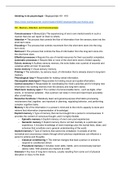Resume
Samenvatting Begrippenlijst Deel 2 Psychology, ISBN: 9781319150518 Inleiding in de psychologie (PB0014)
- Cours
- Établissement
- Book
Uitgebreide volledige begrippenlijst van het vak Inleiding in de psychologie. Bevat alle begrippen van het boek voor deeltentamen 2 (H9 t/m H16). Ook alle begrippen uit YouLearn (+ artikelen) zijn erin verwerkt! Aan het begin van Deel 2 is overigens een link toegevoegd naar de Nederlandse vertal...
[Montrer plus]




